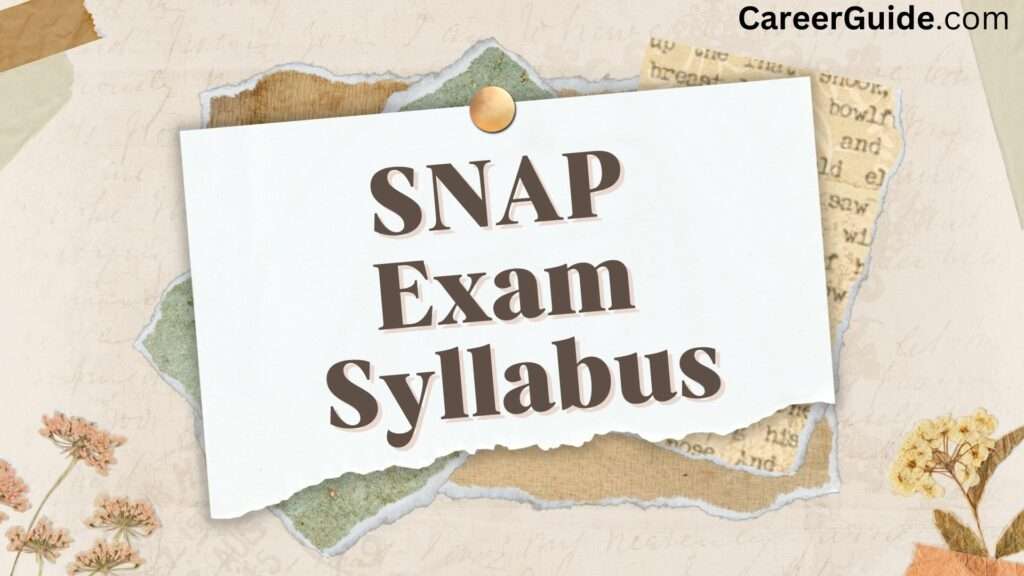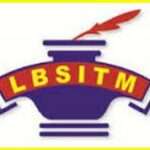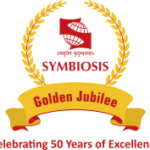SNAP Exam Syllabus: The Symbiosis National Aptitude Test, commonly known as SNAP, is an entrance exam conducted by Symbiosis International University (SIU) for admission to its various management programs offered by different Symbiosis Institutes. SNAP is a computer-based test (CBT) that assesses a candidate’s aptitude in various areas to determine their eligibility for admission.
In this comprehensive guide, I will provide you with detailed information about the SNAP exam syllabus, including its sections, topics, and important tips for preparation.

SNAP Exam Overview
SNAP is a crucial step for candidates aspiring to pursue a Master of Business Administration (MBA) or equivalent program from Symbiosis Institutes. It is conducted once a year, typically in December, and the SNAP score is accepted by several Symbiosis Institutes located across India. The duration of the SNAP exam is 60 minutes, and it consists of four sections. Each section assesses different skills and abilities. Let’s dive into the syllabus for each section:
General English
This section evaluates a candidate’s proficiency in the English language, including reading comprehension, vocabulary, and grammar. The topics covered in this section include:
- Reading Comprehension
- Verbal Reasoning
- Verbal Ability
- Antonyms and Synonyms
- Sentence Correction
- Fill in the Blanks
- Sentence Completion
Tips for General English Section:
- Develop a strong vocabulary by reading newspapers, books, and articles regularly.
- Practice reading comprehension exercises to improve your comprehension skills.
- Work on your grammar skills by revising basic rules and practicing grammar exercises.
Quantitative, Data Interpretation & Data Sufficiency
This section assesses a candidate’s mathematical and analytical skills. The topics covered in this section include:
- Arithmetic (Percentage, Profit and Loss, Time and Work, Ratio and Proportion, etc.)
- Algebra (Equations, Inequalities, Functions)
- Geometry (Lines, Angles, Triangles, Circles)
- Mensuration
- Number System
- Data Interpretation (Tables, Bar Graphs, Pie Charts, Line Graphs)
- Data Sufficiency
Tips for Quantitative, Data Interpretation & Data Sufficiency Section:
- Brush up on your mathematical concepts and formulas.
- Practice solving a variety of quantitative problems from different sources.
- Focus on understanding data interpretation and data sufficiency questions to enhance your analytical skills.
Current Affairs
This section evaluates a candidate’s knowledge of current events and general awareness. The topics covered in this section include:
- Current Affairs (National and International)
- Business and Economy
- Sports
- Awards and Honors
- Books and Authors
- Science and Technology
- History and Geography
Tips for Current Affairs Section:
- Stay updated with current events by reading newspapers, magazines, and online news portals.
- Make a habit of taking notes on important news and events.
- Practice solving current affairs-related questions to improve your general awareness.
Analytical & Logical Reasoning
This section assesses a candidate’s ability to analyze information and make logical decisions. The topics covered in this section include:
- Analytical Reasoning (Arrangements, Blood Relations, Coding-Decoding)
- Logical Reasoning (Statements and Conclusions, Cause and Effect, Decision Making)
- Number Series
- Analogies
- Syllogisms
Tips for Analytical & Logical Reasoning Section:
- Practice solving different types of reasoning puzzles and problems regularly.
- Improve your problem-solving skills by approaching questions logically.
- Work on your time management skills as this section can be time-consuming
Important Points to Remember
Negative Marking: For each incorrect answer, there is a penalty of 25% of the marks allotted to the question. So, it’s essential to answer only when you are reasonably confident.
Time Management: Since SNAP has a fixed duration of 60 minutes, it’s crucial to allocate your time wisely among the four sections. You can choose the order in which you attempt the sections.
Mock Tests: Take advantage of mock tests and practice papers available online and from coaching institutes. This will help you get a feel for the actual exam and improve your time management and problem-solving skills.
Regular Practice: Consistent practice is key to performing well in SNAP. Dedicate sufficient time to study each section of the syllabus thoroughly.
Revision: Don’t forget to revise all the topics you’ve covered. Revision helps in retaining information and reinforcing your understanding of various concepts.
FAQs
The SNAP (Symbiosis National Aptitude Test) exam syllabus includes four main sections: General English, Quantitative, Data Interpretation & Data Sufficiency, Current Affairs, and Analytical & Logical Reasoning. Additionally, there are sections on Mathematical Symbols and Operations, Series and Sequences, and Critical Reasoning.
The General English section assesses your proficiency in English and includes components like reading comprehension, verbal reasoning, verbal ability (antonyms, synonyms, sentence correction, fill in the blanks, sentence completion).
This section covers topics such as arithmetic (percentage, profit and loss, time and work, ratio and proportion), algebra (equations, inequalities, functions), geometry (lines, angles, triangles, circles), mensuration, number system, data interpretation (tables, graphs), and data sufficiency.
The Current Affairs section evaluates your knowledge of recent events, including current events (national and international), business and economy, sports, awards and honors, books and authors, science and technology, and history and geography.
The Analytical & Logical Reasoning section assesses your ability to analyze information, make logical deductions, and solve complex problems. It includes questions on analytical reasoning, logical reasoning, number series, analogies, and syllogisms.










